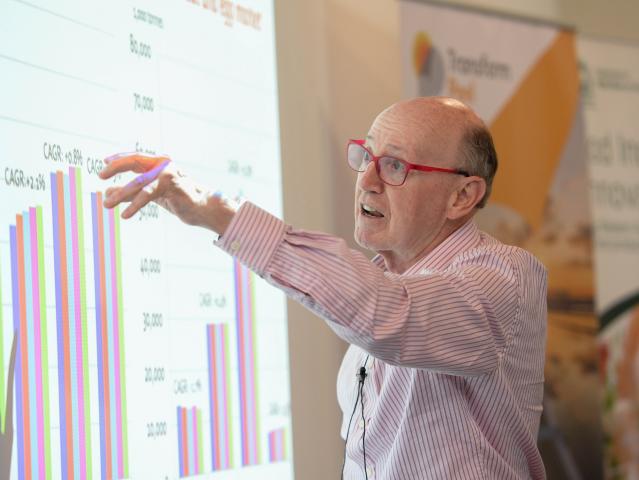Global food trends with Professor David Hughes
All hail flexitarians who want convenient meals with fewer ingredients that provide health benefits, are high in protein, free range and mostly plant-based. This is the changing face of our food future according to international food and beverage commentator Professor David Hughes, who spoke at three seminars hosted by DAFWA in early March.
A key focus of the Food Industry Innovation project is to help WA producers understand global food trends and find new market opportunities.

Professor Hughes’ most recent visit to WA provided timely, relevant insights on food production, packaging and consumption, and on how global consumer and retail trends might affect local businesses and industry. He described these new consumers as time-poor, tech-savvy and socially engaged. For them, “Big Food” like McDonalds, Kelloggs and Coca Cola are out, and smaller artisanal producers with short supply chains are in.
Otherwise known as 'Dr Food' by his blog followers, Professor Hughes is Emeritus Professor of Food Marketing at Imperial College London and an advisor on international food organisation boards, who travels the world consulting to businesses, trade associations and governments. His key message was the global demand for food products with “few, simple, natural ingredients” - a great positive for farmers worldwide.
Global ingredient trends included: products with pronounceable names, natural, traceable, lightly processed and all printed on clear labels. He said buyers wanted shorter, transparent supply chains with provenance and interesting stories about the producers. They also wanted their meat free range and free of additives, with more plant-based protein added to their plates to broaden their healthy eating regimes.
Professor Hughes said traditional meat companies were now having to explain protein much further. He used examples of pea protein cheeseburgers, the Quorn brand of non-meat sausages, TerraVia's algal protein and Mars and Snickers using “protein bars” in their product marketing. Even insects are being farmed for protein (crickets and maggots) for intensive feeding of livestock to target the trend.
Other global trends for food and beverage: buyers want convenience, healthy snack products, more natural fruit/veg drinks and “freshly frozen” such as smoothies. There was also demand for specialty food ingredients such as high fibre, Omega-3 canola, low gluten or gluten-free.

A more recent global trend is the rise of flexitarianism - a part-time fruit/vegetarian who eats some quality meat, nuts, beans and ancient grains. Also popular is natural processing such as cold high pressure processing (HPP), and creating a “real” link with producers.
In Asia there are four broad classes of product in demand: raw materials for their own farms and factories, distinctive products Asia does not produce such as Atlantic salmon and rock lobster, counter-seasonal produce such as kiwi fruit and avocados, and status products including wine, chocolate bars and infant formula.
In China particularly, there is real value placed on imported foods that have a built-in gift appeal. More than 50% of gifts given in China are food, but the food safety and supply chain integrity is vital for those products.
It was important for WA businesses to also understand that Asian consumers did not differ from “westerners” on trends relating to ingredients in their food products. Asian consumers also want to recognise ingredients on the label, a short and simple list, natural ingredients, no artificial ingredients and low fat/sugar/salt. They are more aware of the health attributes of food and have simmering concerns about food safety aspects.
There are significant differences however, in consumers’ preferences between countries and cultures. Understanding customer needs and wants is essential for WA producers who are looking to export their product internationally. Whereas chicken breast meat is highly desirable for many Australian consumers, it is not the meat of choice in many Asian markets and is actually exported for use in cat food. In Asian markets there is a strong preference for chicken wings which is reflected in the higher price compared to chicken breast.
Professor Hughes noted WA had huge opportunities for growth, but also huge challenges in terms of accessing global markets and being competitive against bigger brands.
“There needs to be a collective vision for opportunities to become a reality in WA, an environment where there are food clusters and people work together and compete simultaneously,” he said.
One of the three DAFWA sponsored Professor Hughes’ seminars was hosted by the Peel Development Commission. The Peel event was co-presented by Associate Professor Christopher Vas from Murdoch University’s Singapore Centre for Research in Innovation, Productivity and Technology. Associate Professor Vas spoke on agrifood security trends and the advancement of Smart Urban Farms such as vertical farms and plant factories in Asia, and how WA needed to invest in this technology.
“We can't afford not to do technology if we want to be competitive,” Associate Professor Vas said. “The value-add has to start happening. Opportunities are there and we need to take advantage of them. Urban farms will only add more support systems to traditional farming.”
Better understanding the demands of Asia is a key report produced by DAFWA late last year - the Target Market Opportunities in Asia report. This report confirms there are exciting, high growth, high value premium opportunities for WA producers that have the potential to deliver an estimated $1.3 billion per year in incremental, new export revenue to WA in the next five to seven years.
Dr Hughes said when talking premium food products the margin was in the adjectives: "You've got to be into adjectives"
| Organic | Expensive packaging |
| Small batch | Protected name |
| Ethical | Named producer |
| Artisan | Secret/family recipe |
| Fair trade | Rich/distinct flavour |
| Locally produced | Free range |
| Picturesque source | Grass fed |
| Rare/limited supply | Family owned |
| Cave/barrel aged | Award winning |
| Estate grown | Celebrity endorsed |
| Sustainable | Promoted and advertised |
| Heirloom/rare breed | Expensive ingredients |
(Source: Coriolis research for DAFWA, 2016)
